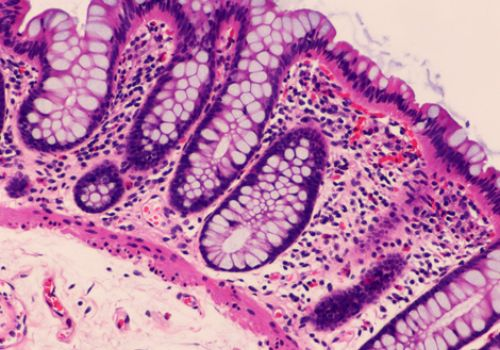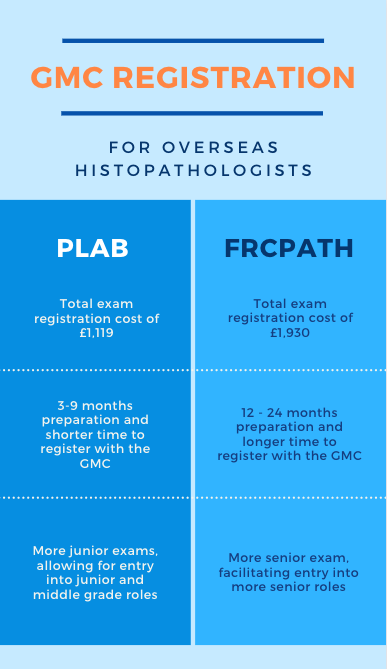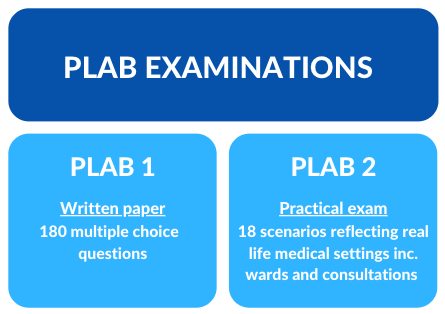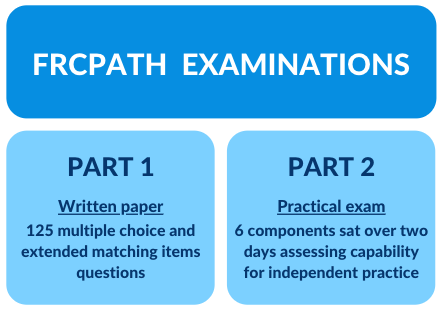FRCPath vs PLAB - GMC registration for overseas pathologists
- January 05, 2022

GMC Registration is a complex process. For histopathologists who’ve qualified outside the EEA region there are two main pathways to consider – FRCPath and PLAB.
Whilst these are the most common routes to GMC registration, this is not an exahaustive list. There are other options such as Royal College sponsorship and GMC-approved qualifications or licensing exams, and you can read more about these here.
Here we will give a summary of both of the main routes and briefly consider their benefits.
- PLAB for GMC Registration
- FRCPath for GMC Registration
- Which is better for me as an overseas pathologist, PLAB or FRCPath?
- #IMG Tips
- How do I get started?
Professional & Linguistics Assessment Board (PLAB)
The first and most popular route with most junior doctors is PLAB.
PLAB is a two-part exam (one written one practical), and which assesses whether you are at least as capable as a doctor starting the second year of their Foundation Programme Training and can therefore work safely as an SHO in the NHS.
The GMC have created a video summary of the PLAB exams which you can watch here, or for a more detailed overview, see our IMG Resources library.
FRCPath - UK Postgraduate Qualification
The UK postgraduate qualification for histopathology – FRCPath Histopathology - is the most popular and recommended route for overseas doctors who have completed a training or residency programme, and will be looking for senior pathology positions in the NHS.
By completing both parts of the FRCPath you are awarded Fellowship of the Royal College of Pathologists. The Royal College of Pathologists is the professional body that regulates the pathology specialties in the UK. Take a look at our IMG Resources library for complete guides on FRCPath for histopathology to learn more.
PLAB vs FRCPath
Both are legitimate routes and will allow you to register with the GMC and work in the UK. To decide which route is best for you, you’ll need to consider the benefits of each and how they align with your priorities and needs in moving to the UK.

Seniority of Positions in the NHS
Histopathology is a consultant led specialty in the UK, and it would be difficult for an overseas pathologist to obtain a more senior post without FRCPath, or extensive experience from a similar, English speaking healthcare system. PLAB alone will not give overseas doctors access to senior posts in the NHS.
Time
PLAB has two stages and can take anywhere between 3-9 months to prepare from start to finish.
FRCPath has two stages and can take anywhere between 18-30 months to prepare from start to finish.
Cost
FRCPath costs just under £1,930 and whilst the Part 2 exam is an in-person exam, the Part 1 exam can be taken online. You can read about the changes to the FRCPath 1 delivery here.
PLAB costs £1,189, and both exams are sat in person. PLAB 1 can be taken in the UK or several overseas centres, which you can find here. PLAB 2 must be taken in the UK.
For both FRCPath Part 2 and PLAB 2, candidates will have to travel to the UK, meaning that the additional cost of visas, accommodation and flights must be factored in.
It’s important to note that these costs can rise if re-sits of the exams are necessary.
Summary
PLAB, as an exam which assesses a doctor’s ability to work safely in the UK, does not demonstrate ability in histopathology specifically. For this reason, PLAB tends to be a route for junior doctors who have not already chosen their field of specialisation in medicine.
Additionally, PLAB can facilitate GMC registration much faster than other routes – so if you feel you can attain an offer of employment in the UK with your overseas experience only – but GMC registration is the one thing standing in your way – PLAB may be a good option for you.
FRCPath involves two more difficult examinations and takes more time to prepare for. Attaining FRCPath in Histopathology will allow you to jumpstart your career in the UK, you’ll most likely be able to take a consultant role. You would not need PLAB or Core Training in addition to FRCPath.
Additionally, histopathology in the UK is also a consultant-led specialism, and FRCPath demonstrates competency to practice unsupervised as a consultant.
#IMG Tips
- Determine your priorities – your goals and timeline for relocating to the UK are important in deciding which route is best for, and this is different for everyone.
- Plan well ahead – depending on the route you choose, you may be embarking on a long journey through these exams, so plan how you will fit them into your life and how best to prepare to maintain a good work-life balance at the same time.
- Find a support network – once you know which exams you will sit, find a support network of others who are also preparing for the exam. A great way to do this is to join IMG Histopathologists, an online pathology community of UK and NHS histopathology aspirants and dedicated histopathology recruiters. You’ll find advice, guidance and news and updates about all things histopathology for IMGs. Join the conversation here.
Getting started
Once you’ve decided which exams are best for you, it’s time to delve deeper into the exams and what they entail. For more useful blogs and articles on PLAB or FRCPath exams, registrations and qualifications to help you find your dream job in the NHS - take a look at our IMG Resources library.
Or if you have any questions on PLAB or Postgraduate qualifications, feel free to get in touch with our histopathology consultants here.
For regular news and updates, follow IMG Connect on social media using the links below.
Relevant Jobs
An NHS university teaching hospital in East Yorkshire are recruiting for a Consultant in Histopathology with an interest in gynaecological, gastrointestinal, skin, head and neck, breast, urological, or cardiothoracic pathology. The Histopathology department comprises a team of consultants and is supported by a large team of middle grade doctors. This Histopathology job is open to both international applications and UK-based doctors, though those with European Specialist or FRCPath qualifications are most encouraged to apply.
Anyone requiring portfolio support (formally known as CESR) can have their required support discussed on a case by case basis.
JOB REQUIREMENTS AND DETAILS
6 months NHS consultant experience is desired for this role, though anyone with specialist registration should apply also, and anyone with an interest in gynaecological, gastrointestinal, skin, head and neck, breast, urological, or cardiothoracic pathology will be most welcome.
CORE DUTIES OF THIS ROLE
-
Deliver expert histological and cytological diagnostics as part of a subspecialist team.
-
Contribute to teaching of junior medical staff and medical students.
-
Participate in clinical governance, clinical audit, and departmental management.
-
Engage in MDTs and ensure maintenance of subspecialist expertise through CPD and EQA participation.
LIFE IN EAST YORKSHIRE
This hospital is based in a dynamic coastal region with urban living options in the city and peaceful rural life in nearby market towns.
The area offers top-performing schools, excellent universities, efficient road and rail links, and a wealth of family-friendly leisure activities from museums to national parks.
Steeped in maritime history, the area is known for its cultural vibrancy and as a former UK City of Culture, with a variety of architectural, historical, and recreational gems to explore.
HOW WILL IMG CONNECT SUPPORT YOU?
When applying with IMG Connect you’ll have the full support of an expert recruitment team who will be your recruitment and relocation partners throughout the process. We\'ll support you with:
- CV Preparation with a bespoke session with one of our specialists
- Application support with expert knowledge of NHS specialisms & recruitment practice
- At least two video calling interview preparation sessions
- Contract and offer negotiations for salary, relocation packages, tenure and more
Once you have accepted your new role, you’ll then be supported and led throughout by one of our dedicated relocation executives who will guide you through all the way to starting to your new role including:
- Document gathering and checking COS and Visa Application support if applicable
- Support sourcing short- and long-term accommodation
- Travel Arrangements
- Family support for finding schools and any other aspects of pastoral care
Eligibility for these roles:
- Specialist Registration in Histopathology with the GMC - this is essential and candidates cannot be considered without this.
- Strong experience reporting histology in cardiothoracic pathology
A leading NHS hospital in South West England is looking for a Consultant in Histopathology with an interest in general histopathology and non-gynae cytology, with opportunities to develop a special interest. The Histopathology department consists of a team of highly experienced consultants, supported by middle-grade doctors. This Histopathology job is open to both international and UK-based applicants, though those with FRCPath or equivalent qualifications are particularly encouraged to apply.
Anyone requiring portfolio support (formally known as CESR) can have their required support discussed on a case-by-case basis.
JOB REQUIREMENTS AND DETAILS
FRCPath or equivalent qualification and CCT within 6 months of interview (or international equivalent) with experience in general histopathology and non-gynae cytology are required for this role, and The salary will be between the standard NHS Consultant pay scale, with salary dependent on experience or grade.
CORE DUTIES OF THIS ROLE
- Provide high-quality histopathology and non-gynae cytology diagnostics.
- Participate in MDT meetings and offer expert histopathological opinions.
- Engage in teaching and mentorship of junior doctors and medical students.
- Contribute to audit, governance, and quality assurance initiatives.
LIFE IN SOUTH WEST ENGLAND
This hospital is located in a thriving town in South West England, offering urban living with access to quieter rural surroundings. The region provides excellent schools, strong transport links to major cities, and a variety of recreational activities, including beaches, national parks, and cultural festivals.
Historically, the area is known for its medieval landmarks, natural beauty, and rich cultural heritage, making it an excellent location for both professional and personal life.
HOW WILL IMG CONNECT SUPPORT YOU?
When applying with IMG Connect you’ll have the full support of an expert recruitment team who will be your recruitment and relocation partners throughout the process. We\'ll support you with:
- CV Preparation with a bespoke session with one of our specialists
- Application support with expert knowledge of NHS specialisms & recruitment practice
- At least two video calling interview preparation sessions
- Contract and offer negotiations for salary, relocation packages, tenure, and more
Once you have accepted your new role, you’ll then be supported and led throughout by one of our dedicated relocation executives who will guide you through all the way to starting your new role, including:
- Document gathering and checking
- COS and Visa Application support if applicable
- Support sourcing short- and long-term accommodation
- Travel Arrangements
- Family support for finding schools and any other aspects of pastoral care
Cellular Pathology Services
The Cellular and Anatomical Pathology Department encompasses histopathology, cytopathology, neuropathology, and anatomical pathology. Annually, it processes approximately 38,000 surgical biopsies, 2,000 non-cervical cytology samples, and conducts around 1,100 postmortem examinations.
The department is staffed by a multidisciplinary team, including consultant pathologists, biomedical scientists, and technical specialists. Services provided involve diagnostic evaluations of tissue samples to identify diseases such as cancer and precancerous conditions, utilizing techniques like special stains, immunocytochemistry, electron microscopy, and molecular methods. The department\'s facilities are equipped to deliver timely and accurate diagnoses, with most straightforward biopsies reported within 14 working days.
Eligibility
Working arrangements can be discussed openly, with an understanding that flexible working and full off-site reporting is accepted and offered for those requiring so, and with specialist registration NHS consultant experience are invited to apply.
A teaching hospital in Scotland is looking for a Consultant in Cellular Pathology with an interest in gastrointestinal and/or hepatobiliary pathology. The pathology department comprises a team of 15 consultants and is supported by a team of specialty trainees and biomedical scientists. This Cellular Pathology job is open to both international applications and UK-based doctors, though those with European Specialist qualifications or FRCPath are most encouraged to apply.
Anyone requiring portfolio support (formally known as CESR) can have their required support discussed on a case-by-case basis.
JOB REQUIREMENTS AND DETAILS
FRCPath or equivalent and at least five years of training in pathology are required for this role. Anyone with an interest in gastrointestinal and/or hepatobiliary pathology should apply. The salary will be between £107,144 - 142,369, dependent on experience or grade.
CORE DUTIES OF THIS ROLE
- Provide diagnostic histopathology and/or cytopathology services, with a focus on gastrointestinal and hepatobiliary pathology.
- Participate in multidisciplinary team meetings, ensuring quality case discussion and consensus.
- Contribute to the training and supervision of pathology trainees and biomedical staff.
- Engage in continuous service improvement and audit activities to maintain high-quality standards.
LIFE IN SCOTLAND
This hospital is located in a vibrant city by a major river, offering a mix of urban and rural living. Popular areas for living include both lively city neighborhoods and tranquil countryside settings.
The region boasts excellent schools, convenient transport links to major cities, and leisure activities including hiking, cycling, and cultural venues like museums and concert halls.
Historically, this area has been a center for innovation, with a strong reputation for industries ranging from life sciences to creative technology.
HOW WILL IMG CONNECT SUPPORT YOU?
When applying with IMG Connect you’ll have the full support of an expert recruitment team who will be your recruitment and relocation partners throughout the process. We\'ll support you with:
- CV Preparation with a bespoke session with one of our specialists
- Application support with expert knowledge of NHS specialisms & recruitment practice
- At least two video calling interview preparation sessions
- Contract and offer negotiations for salary, relocation packages, tenure and more
- Once you have accepted your new role, you’ll then be supported and led throughout by one of our dedicated relocation executives who will guide you through all the way to starting to your new role including:
- Document gathering and checking
- COS and Visa Application support if applicable
- Support sourcing short- and long-term accommodation
- Travel Arrangements
- Family support for finding schools and any other aspects of pastoral care





